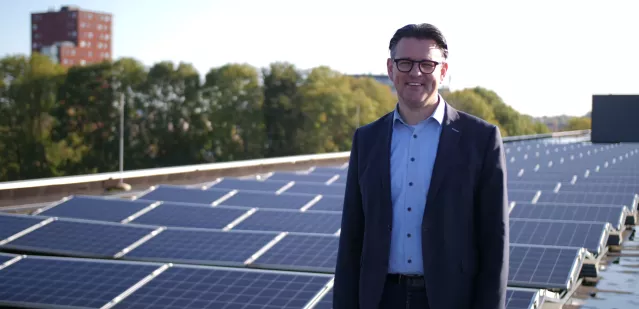
Plastic water bottles in the trash can
To save, individual change is good, Rutten finds. “Saving is about using what you already have more efficiently as well. About awareness of what you do with your water bottle, or your used coffee mug. Students and employees get a discount at some of our coffee bars if they bring their own mug and in the coming months, we want to stop selling plastic water bottles. Drinking water is part of a healthy lifestyle and this means that we, too, have to wonder: how can we realise sufficient water fountains and how can we make it attractive. We are currently looking for an opportunity for a water bar, where you can get mint leaves, lemon and other additives for your water.”
Long live the LED bulb
Big buildings are often energy drains, and this can often be done more efficiently. There is a lot of potential to save on energy usage. The roofs of the Leeuwarden campus buildings are covered in solar panels and plans are being developed to do more with this in Meppel, Emmen, and Terschelling as well. Rutten: “This is not only beneficiary when the sun is shining. On the weekends, for instance, we deliver an energy surplus back to the grid. We are also placing led bulbs at all locations in phases. This does not only reduce the energy costs, it is a gain in sustainability, because we are less reliant on fossil fuels.”
A closer look at waste
A lot can be done with waste, even at an institution like NHL Stenden. Circular entrepreneurship, recycling, upcycling, reusing. Even so, there are no waste separation bins anywhere at NHL Stenden. Rutten explains: “Many people don’t know that we ‘post sort’ our waste. Waste processor Omrin collects our waste and delivers it to a big waste separation facility. This is where the waste is separated.” He continues: “It may sound inefficient, but at the moment, this is the most economically sound way of doing it. If we were to separate our waste in PET, green waste and assorted, then we would need three garbage trucks to pick up our waste and then Omrin would separate it yet again.”
Research into food waste
When we speak about food, it is often about food waste. Rutten thinks this is a shame: “The Facility Management department has a great collaboration with the Sustainability in Hospitality and Tourism professorship (applied sciences), for instance. This is where researchers and Hotel Management School students work together to research how to prevent food wastage. Rutten elaborates: “One of the ways to reduce wastage may be to offer smaller portions. This does not only result in a financial gain, but we would save the environment and use less raw materials.” The fun thing is that these issues concerning sustainability are also noticeably on the students’ mind. “In Meppel we hear students asking for metal cutlery, because it is a shame to keep throwing away plastic.”
A look at the supply chain
Things that may count as saving for NHL Stenden, may not always have a positive effect on the whole supply chain, Rutten says. “I think that we should also look for ways to save in the complete supply chain; the suppliers and those who process our waste. We bring our used furniture to ‘Opnieuw’ [Again], where they get a new lease of life.” Sustainability also plays a role in his personal life. “We can be aware of this issue as individuals as well. Supermarkets are loaded with a lot of single-use packaging materials. This is often necessary to keep the products fresh, but this is not always the case. My daughter loves mini bell peppers, so we often have those in stock. At one point, we had four empty buckets in our cupboard. Why a new bucket every time? We now take these to the supermarket, top them up and pay. You obviously don’t have to bring your own packaging every time, but with a decrease in waste, we also save somewhere down the supply chain.”



